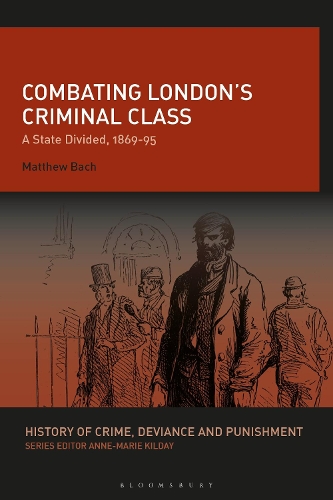
Combating Londons Criminal Class: A State Divided, 1869-95
(Paperback)
Publishing Details
Combating Londons Criminal Class: A State Divided, 1869-95
By (Author) Matthew Bach
Bloomsbury Publishing PLC
Bloomsbury Academic
27th January 2022
United Kingdom
Classifications
Tertiary Education
Non Fiction
Crime and criminology
Legal history
Social and cultural history
364.40942109034
Physical Properties
Paperback
208
Width 154mm, Height 232mm, Spine 14mm
320g
Description
The criminal class was seen as a violent, immoral and dissolute sub-section of Victorian Londons population. Making their living through crime and openly hostile to society, the lives of these criminals were characterised by drunkenness, theft and brutality. This book explores whether this criminal class did indeed truly exist, and the effectivenessof measures brought against it. Tracing the notion of the criminal class from as early as the 16th century, this book questions whether this sub-section of society did indeed exist. Bach discusses how unease of Londons notorious rookeries, the frenzy of media attention and a [word deleted here] panic among the general public enforced and encouraged the fear of the criminal class and perpetuated state efforts of social control. Using the Habitual Criminals Bills, this book explores how and why this legislation was introduced to deal with repeat offenders, and assesses how successful its repressive measures were. Demonstrating how the Metropolitan Police Force and London's Magistrates were not always willing tools of the British state, this book uses court records and private correspondence to reveal how inconsistent and unsuccessful many of these measures and punishments were, and calls into question the notion that the state gained control over recidivists in this period.
Reviews
Bachs meticulous reconsideration of the evidence is a caution against conflating policy and practice. For criminologists and sociologists, as well as crime and social historians, Bach raises these fundamental considerations whilst reaffirming the importance of clear, original and evidence-led research. Combatting Londons Criminal Class is, therefore, a valuable and most welcome addition to research in this area. * Cultural and Social History *
This is an interesting case study of how one part of the legal system (that focused on the repression of habitual offenders) operated in the Victorian era. The theme of repeat offenders can speak to larger questions related to Victorian understandings of crime and criminality, the nature of the state, and the limits of governmentality. It will provide an in-depth look at how the system of policing and surveillance functioned in the Victorian era, and will be able to point out its inherent contradictions and failings. * Ellen Boucher, Associate Professor of History and Chair of European Studies, Amherst College, USA *
A really interesting, new take on nineteenth-century crime. It made me think differently about how Id been studying the history of crime and policing. A key strength is the proposals account of the need we have for a project of this kind. Even in the busy field of crime studies, the area of organised crime is something we do not hear a lot about. * Andrew Mangham, University of Reading, UK *
Im very taken by it. Its main virtue, as I see it, is the way it delves beneath the theories and legislation of the period with regard to recidivism, to the actual practice of the magistrates and police who were responsible for implementing them, to show how different they were; with both law enforcement agencies avoiding or tempering the more repressive effects of the 1869 and 1871 Acts. So what Parliament enacted was not necessarily a guide to what happened on the ground; a lesson that historians in other areas of British social history might profitably take on board. * Bernard Porter, Emeritus Prof, Newcastle University, UK *
Author Bio
Matthew Bach is Deputy Principle of Ivanhoe Girls Grammar School in Melbourne, Australia. He was awarded his PhD by the University of Melbourne in 2018 and has published his research in journals such as IPA Review.
